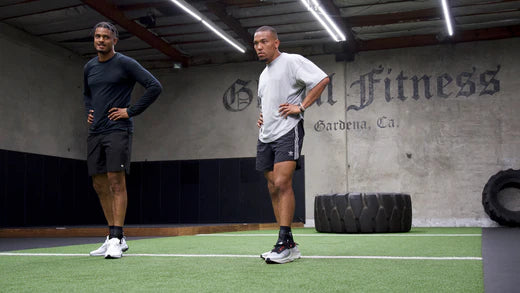With a good half marathon training plan, you'll stay motivated and injury-free. Our products provide targeted support and ensure stability in training and safety during competition. We show you how to plan your training sensibly – and how The BetterGuards protect you without slowing you down.
Half marathon training plan – what's behind it and why you need one
A half marathon training plan brings structure to your mind – and your legs. Without a plan, you often run too much, too fast or simply wrong. The result? Frustration or injury.
A good half marathon training plan doesn't just take the distance into account. It guides you systematically from week to week with endurance runs, tempo changes, intervals and – very importantly – sufficient recovery. Each session has a clear goal.
This allows you to build up your fitness, improve your pace and still give your body the breaks it needs. This is the only way to stick with your training and really get through it. A training plan for a half marathon is not a nice-to-have. It makes the difference between just participating and reaching your full potential.
Reaching the finish line without a plan? These mistakes will cost you time, energy, and nerves
Many people start running without a plan or structure and wonder why it doesn't work. Sometimes they run 5 km, then a long run without preparation. No targeted increase, hardly any recovery, zero change of pace. Sounds like progress? It usually ends in frustration.
It can quickly become dangerous, especially for beginners. Too much at once and your body shuts down. The result: pain or a break from training. A training plan for half marathon beginners prevents exactly that. It takes the pressure off you and ensures that you remain stable week after week.
With a good half marathon training plan for beginners, you won't hit a wall, but run toward your goal. Step by step and with a well-thought-out plan.
Your path: 8, 10, or 12 weeks—how much training time do you need?
Not everyone needs the same plan. If you run regularly, your body is used to training, and you just want to work on your pace, an 8-week half marathon training plan is often enough. Short, sweet, and to the point—but still challenging.
Do you already have basic endurance but want more time for speed work and longer distances? Then a 10-week half marathon training plan offers a better balance.
And if you're just starting out or have taken a long break, don't stress. A 12-week half marathon training plan gives you plenty of leeway. You start slowly, give your body the time it needs, and make progress without overdoing it.
Whether you want to finish or have a specific time in mind, a half marathon training plan brings structure to your running training.
Run through – but do it right: How to protect yourself from injuries
Whether you just want to finish the half marathon or are following a half marathon training plan to run under 2 hours, your ankles do most of the work. Every change of direction and every interval puts pressure on them.
If you train without protection, you risk setbacks. The solution? Stability that kicks in when you need it – and stays out of the way when you want to run freely.
Betterguards offers you exactly that:
- Adaptive stability during quick changes of direction
- No rigid support – full freedom of movement
- Ideal for running training with sprints and intervals
- Supports recovery during intense phases
This allows you to run better without tape or rigid bandages and without unnecessary risk of injury.

Your half marathon training plan – here's what it could look like
A good half marathon training plan focuses on clear stimuli instead of mindless mileage. Three to four sessions per week are enough – if they are distributed sensibly. You need long runs for your head, tempo changes for your muscles, and rest days for progress.
Here's what your plan could look like:
- Weeks 1–4: Consolidate technique, build basic endurance
- Weeks 5–8: Tempo runs, progressive load
- Weeks 9–12: Tapering, final push, recovery
A half marathon training plan for beginners should always allow for flexibility. Don't stress if something comes up – the important thing is to stick to the plan.
If you already have some experience, a compact 8-week half marathon training plan is often enough. The main thing is to stay consistent.
Conclusion – a clear plan, a clear decision: how to get the most out of it
If you want to improve, you need structure. If you want to stick with it, you have to take care of yourself. Progress doesn't come from hard work, but from smart training – and the right tools.
With a good plan, recovery phases, and smart protection, you'll not only run further, but also safer.
Get the right support for your half marathon training with BetterGuards now – and run without looking back.




